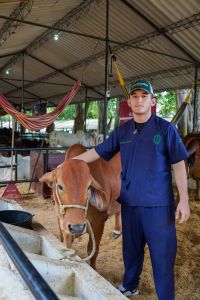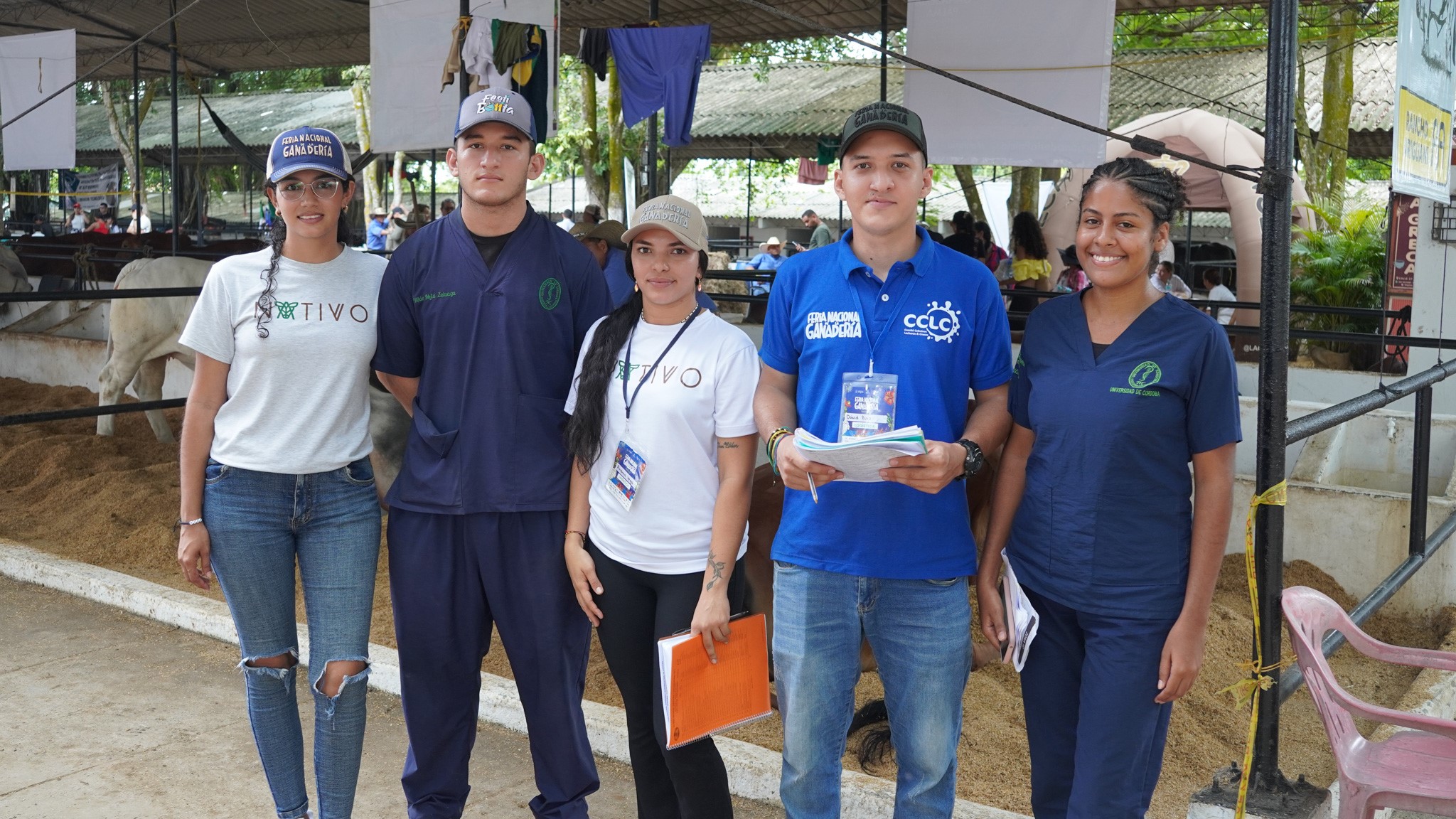 Montería, 22 de junio de 2025. La Universidad de Córdoba sigue reafirmando su grandeza académica y su compromiso con el desarrollo del país, esta vez a través del valioso aporte de los estudiantes del programa de Medicina Veterinaria y Zootecnia, quienes durante 15 días ofrecieron soporte técnico, científico y logístico a la Feria Nacional de la Ganadería, uno de los eventos más importantes del gremio agropecuario en Colombia.
Montería, 22 de junio de 2025. La Universidad de Córdoba sigue reafirmando su grandeza académica y su compromiso con el desarrollo del país, esta vez a través del valioso aporte de los estudiantes del programa de Medicina Veterinaria y Zootecnia, quienes durante 15 días ofrecieron soporte técnico, científico y logístico a la Feria Nacional de la Ganadería, uno de los eventos más importantes del gremio agropecuario en Colombia.
Cerca de 15 estudiantes, liderados por Alexandra Salgado Padilla, estudiante de último semestre de Medicina Veterinaria, cumplieron jornadas extenuantes en labores fundamentales para el éxito de la Feria, entre ellos: recepción, ubicación, manutención, acompañamiento sanitario y manejo de ejemplares en competencias ganaderas.
“Estamos desde antes de que inicien las competencias. Recibimos animales que vienen de lugares tan distantes como Bucaramanga, los Llanos o Valledupar, verificamos su estado, apoyamos en su ubicación y velamos por su bienestar durante toda la Feria. También asistimos las competencias desde la prepista, acompañando a cada ganadería y asegurando el orden y cumplimiento del cronograma”, explicó Alexandra.
Por más de 40 años la alma mater ha realizado este acompañamiento, que va más allá de una práctica académica, representa un verdadero respaldo a la Feria, que encuentra en Unicórdoba un aliado estratégico con conocimiento, experticia y compromiso, lo cual garantiza eficiencia y cuidado especializado de los ejemplares.
La experiencia también transforma a los estudiantes porque les permite conocer de cerca el entorno ganadero, establecer contactos profesionales, descubrir nuevas oportunidades laborales y fortalecer habilidades blandas como la comunicación, el trabajo en equipo y la resolución de problemas en tiempo real.
“La Feria confía cada año en nuestros estudiantes porque el programa de Medicina Veterinaria y Zootecnia de Unicórdoba, es el mejor del país, forma profesionales con competencias integrales. La relación con Ganacor se ha fortalecido, y muchos de nuestros egresados hoy hacen parte de esta agremiación; incluso, estudiantes con condiciones especiales han participado activamente, demostrando que este ejercicio es inclusivo y enriquecedor”, destacó Salgado.
A través de esta vivencia, los futuros médicos veterinarios y zootecnistas aportan al país desde la ciencia y el conocimiento, y consolidan la presencia de la Universidad de Córdoba como una institución transformadora, que magnifica su compromiso con el sector agropecuario y la vida rural, y que con orgullo contribuye al desarrollo regional y nacional con excelencia académica.
How Betzoid Canada Analyzes Online Betting Trends Across Canada
The landscape of online betting in Canada has undergone dramatic transformation since the federal government’s decision to modernize gaming legislation in 2021. This shift has created an unprecedented opportunity to analyze betting patterns, preferences, and behaviors across the country’s diverse provinces and territories. Understanding these trends requires sophisticated data collection methods, advanced analytical frameworks, and deep knowledge of regional gambling cultures that have evolved over decades.
The Evolution of Canadian Online Betting Analytics
Canada’s approach to online betting analysis has its roots in the traditional lottery and casino systems that operated under provincial jurisdiction for over half a century. The Canadian Criminal Code historically restricted sports betting to parlay wagers, creating a unique market dynamic that influenced how Canadians engaged with gambling activities. When single-event sports betting became legal in August 2021, it triggered a seismic shift in data collection and analysis methodologies.
Provincial gaming corporations had been collecting limited data on retail betting patterns, but the digital transformation opened new avenues for comprehensive trend analysis. The transition from physical to digital platforms enabled real-time data capture across multiple dimensions: geographic distribution, demographic segmentation, seasonal variations, and sport-specific preferences. This evolution required sophisticated technological infrastructure capable of processing vast amounts of transactional data while maintaining strict privacy and regulatory compliance standards.
The analytical framework developed during this period incorporated machine learning algorithms, predictive modeling, and behavioral analysis techniques borrowed from financial services and e-commerce sectors. These methodologies allowed for the identification of patterns that were previously invisible in traditional gambling environments, such as micro-betting behaviors, cross-platform migration patterns, and the correlation between major sporting events and betting volume fluctuations.
Regional Variations and Cultural Influences
Canada’s vast geography and cultural diversity create distinct regional betting patterns that require nuanced analytical approaches. Atlantic Canada demonstrates strong preferences for traditional sports like hockey and baseball, reflecting deep-rooted cultural connections to these activities. The Maritime provinces show consistent engagement with seasonal sports betting, with notable spikes during NHL playoffs and CFL seasons.
Quebec presents unique analytical challenges due to its distinct cultural identity and language preferences. The province’s betting patterns often diverge from national trends, with higher engagement in soccer betting and different peak activity periods that align with European sporting schedules. This regional variation necessitates specialized analytical models that account for cultural and linguistic factors influencing betting behavior.
Ontario, as Canada’s most populous province, generates the largest volume of betting data and exhibits the most diverse patterns. The province’s multicultural demographics create complex betting ecosystems where traditional North American sports coexist with international preferences. Research platforms like Betzoid Canada have documented how Toronto’s diverse population drives engagement with cricket, soccer, and basketball betting at rates significantly higher than the national average.
Western Canada presents another distinct analytical profile, with Alberta and British Columbia showing strong preferences for hockey and football betting, while also demonstrating growing interest in emerging sports categories. The region’s economic cycles, particularly those related to natural resource industries, create unique correlations between economic indicators and betting volume patterns that require specialized analytical consideration.
Technological Infrastructure and Data Collection Methods
Modern online betting trend analysis relies on sophisticated technological infrastructure capable of processing millions of data points in real-time. The Canadian market’s regulatory environment requires compliance with multiple provincial frameworks, creating complex data governance challenges that influence analytical methodologies. Each province maintains distinct reporting requirements and privacy standards that affect how data can be collected, stored, and analyzed.
The technological stack typically includes cloud-based data warehouses, real-time streaming analytics platforms, and advanced visualization tools that enable analysts to identify trends as they emerge. Machine learning algorithms process historical data to identify seasonal patterns, predict peak activity periods, and detect anomalous behaviors that might indicate problem gambling or fraudulent activities.
Data collection methods encompass multiple touchpoints across the betting ecosystem. Transaction data provides insights into betting volumes, frequency, and monetary values. User interaction data reveals preferences for specific sports, betting types, and platform features. Geographic data enables analysis of regional trends and helps identify emerging markets or declining activity areas.
The integration of mobile analytics has become particularly crucial as smartphone betting dominates the Canadian market. Mobile data provides unique insights into betting behaviors, including time-of-day patterns, location-based preferences, and the relationship between major sporting events and spontaneous betting activities. This mobile-first approach to data collection has revolutionized understanding of Canadian betting behaviors and enabled more precise trend forecasting.
Regulatory Compliance and Responsible Gaming Analytics
Canadian online betting analysis operates within a complex regulatory framework that varies significantly across provinces. Each jurisdiction maintains distinct requirements for data reporting, responsible gaming monitoring, and consumer protection measures. This regulatory diversity creates analytical challenges but also opportunities for comprehensive trend analysis across different regulatory environments.
Responsible gaming analytics have become integral to trend analysis, with sophisticated algorithms designed to identify patterns associated with problem gambling behaviors. These systems monitor betting frequency, escalating wager amounts, time spent on platforms, and other behavioral indicators that might suggest gambling-related harm. The data collected through these monitoring systems provides valuable insights into the broader betting ecosystem while supporting harm prevention initiatives.
Privacy regulations, particularly those aligned with federal and provincial privacy legislation, influence how betting data can be collected and analyzed. Anonymization techniques, data retention policies, and consent management systems all impact the analytical process while ensuring compliance with evolving privacy standards. These regulatory requirements have driven innovation in privacy-preserving analytics techniques that maintain analytical value while protecting individual privacy rights.
The regulatory environment also influences trend analysis through reporting requirements that mandate specific data collection and analysis activities. Provincial gaming regulators require detailed reports on betting volumes, player behaviors, and market trends, creating standardized datasets that enable comparative analysis across jurisdictions and time periods.
Understanding how online betting trends are analyzed across Canada reveals the sophisticated intersection of technology, regulation, and cultural dynamics that shape the modern gambling landscape. The methodologies developed to capture and interpret these trends continue to evolve as the market matures and new technologies emerge. This analytical foundation supports not only commercial decision-making but also regulatory oversight and responsible gaming initiatives that protect Canadian consumers while enabling a thriving, regulated betting environment.
 Montería, 22 de junio de 2025. La Universidad de Córdoba sigue reafirmando su grandeza académica y su compromiso con el desarrollo del país, esta vez a través del valioso aporte de los estudiantes del programa de Medicina Veterinaria y Zootecnia, quienes durante 15 días ofrecieron soporte técnico, científico y logístico a la Feria Nacional de la Ganadería, uno de los eventos más importantes del gremio agropecuario en Colombia.
Montería, 22 de junio de 2025. La Universidad de Córdoba sigue reafirmando su grandeza académica y su compromiso con el desarrollo del país, esta vez a través del valioso aporte de los estudiantes del programa de Medicina Veterinaria y Zootecnia, quienes durante 15 días ofrecieron soporte técnico, científico y logístico a la Feria Nacional de la Ganadería, uno de los eventos más importantes del gremio agropecuario en Colombia.
